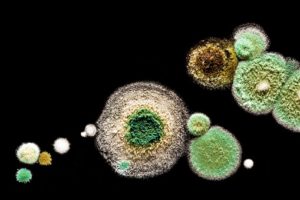Understanding Mold Allergies
What is a mold allergy?

A mold allergy is when your body overreacts to mold spores that you breathe in. Being around mold spores can make you cough and experience other symptoms. Many times your mold allergy is associated with asthma. If you have a mold allergy, it is best to reduce or avoid your exposure to different types of molds that can cause an allergic reaction.
Symptoms of mold allergy
There are a variety of signs and symptoms that can occur when you have a mold allergy. Mold allergy symptoms can also vary from each individual to the next and range from mild to severe. Symptoms of mold allergies are similar to other types of upper respiratory tract signs and symptoms that include:
- Sneezing
- Wheezing
- Cough and postnasal drip
- Runny or stuffy nose
- Watery and or itchy eyes
- Itchy nose and throat
- Dry scaly skin
- Worsening of asthma overtime
- Shortness of breath
- Chest tightness
If you experience severe signs and symptoms of mold allergies, it is best to speak with your doctor or an allergist to discuss treatment options.
Causes of mold allergy
A mold allergy is caused or triggered by your immune system reacting to an allergen. In the case of a mold allergy, the allergens are small, airborne mold spores. Once you breathe in the mold spores, your body’s immune system overreacts because your body recognizes them as foreign and makes antibodies to fight them. In the process, every time you are exposed to the mold spores, your immune system will react by releasing a chemical known as histamines. Histamines are what leads to the signs and symptoms you experience, such as runny nose, itchy and watery eyes, and others. There are many types of molds that can cause allergies. Some common ones are aspergillus, cladosporium, and penicillium. If you are allergic to one type of mold, does not necessarily mean you are allergic to all of them. You will have to check with your doctor or allergist to see what types of testing can be done to definitely identify which molds you are allergic to.
Preventing mold allergy
If you have a mold allergy, there are ways to prevent your allergy from being triggered by reducing mold growth in your home. You can start with eliminating any source of dampness in your basements such as pipe leaks or ground water seepage to get rid of mold from growing. You can use a dehumidifier in your home in areas that smells musty or damp to limit mold spores and growth. Use an air conditioner with a high-efficiency particulate air (HEPA) filter to trap mold spores that is in the air inside your home. Remember to regularly change your filters for your furnace and air conditioners. Ensure that all bathrooms are properly ventilated to decrease moisture and limit mold growth.
If you would like to discuss testing for a mold allergy, treatment options, or have any questions, give us a call at 805-658-9500. The specialists at Allergy, Asthma, and Immunology Medical Group will be more than happy to help you.



